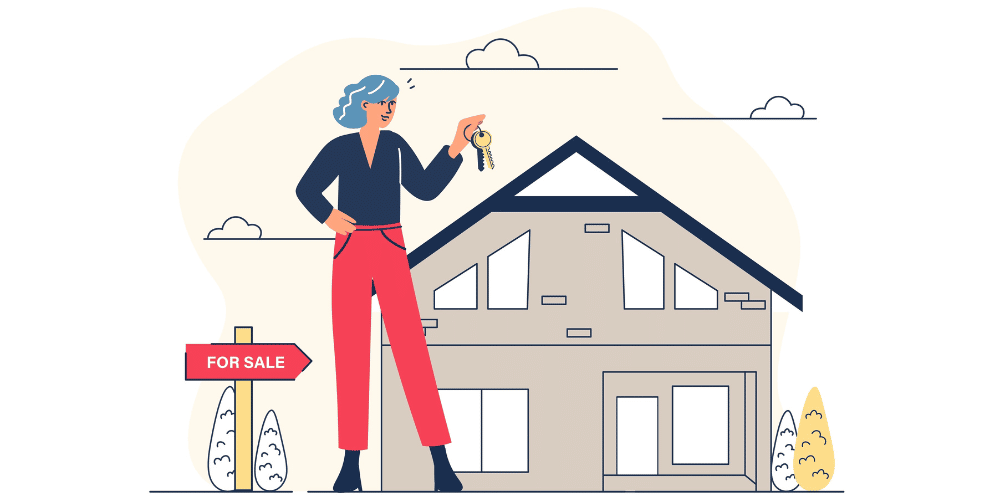
Published
Cost to sell a house | Cheapest ways to sell | Boost your home value before selling
Key takeaways
- Sellers generally pay 7.59–8.59% of the final home sale price in closing costs.
- Everyday homeowners can keep costs low by working with a low-commission listing agent or selling to a cash buyer.
- More experienced sellers can bypass agents and use an FFMLS company or sell FSBO.
Real estate commissions make up a large chunk of closing costs (typically 5–6% of the sale price).
The cheapest way to sell a home is to list with a low-commission real estate agent, make minor repairs yourself, focus on renovations that maximize your investment, and sell your home at the most favorable time for sellers.
Free agent matching services pre-negotiate lower listing commission rates, saving sellers an average of $9,600 in fees.
How much does it cost to sell a house?
The cost to sell a home will vary by market and type, but it typically ranges 7.59–8.59% of the final sale price. For the median home value in the U.S. ($340,000 in the third quarter of 2022), that’s between $25,908 and $29,206 in closing costs.
Seller closing costs
You’ll pay around 1.1% of your home’s price in closing costs.
| Seller closing costs | Fee amount (national averages) |
|---|---|
| Realtor commission fees | 5–6% of the sale price |
| Settlement or attorney fees (if applicable) | Flat fee ($800–1,500) or hourly rate ($150–400) |
| Conveyance fee (transfer tax) | 0.05–2.2% of the sale price |
| Appraisal fee | $350–600 |
| Home inspection | $300–500 |
| Recording fees | $118 |
| HOA fees | $200–300 |
| Title search | $300 |
| Title insurance (owners policy) | $1,131 |
| Courier fee | $50–75 |
| Broker fee | $200–300 |
| Pest inspection | $75–150 |
| Prorated property tax | Varies by location |
How to lower closing costs and sell your house cheap
You can negotiate some closing costs with buyers, especially when you’re in a sellers market. You can also cut costs by shopping around and finding the best rates and prices for certain services, such as real estate commissions and title insurance.
What is the cheapest way to sell a house?
| Overall: | Work with a low-commission agent |
| Experienced sellers: | Work with a flat-fee MLS company |
| Sell ASAP: | Price your home below market value |
| Bare bones: | List your home For Sale By Owner (FSBO) |
| Offload property fast: | Sell to real estate investors |
Work with a low-commission agent
Flat-fee or low-commission agents will list, market, and sell your home for a reduced commission rate. Depending on the brokerage, you can still get a full-service realtor, just at a lower price!
How it saves you money: Most low-commission services charge about 1–2% of the final sale price, versus the traditional 2.5–3% paid to each agent.
Pros and cons of selling with a low-commission realtor
✅ Thousands in savings: for the median-priced home in the U.S. ($340,000), a flat-rate agent of $3,000 would save you between $3,800 and $7,200. The savings are even greater for homes that sell above $350,000.
✅ Time saved: many low-commission real estate companies match you with agents, so you won’t have to hunt down agents yourself.
❌ Limited selection of agents: some low-commission companies, such as Redfin and Houwzer, may not have a wide selection of local agents.
❌ No savings on buyer agent commissions: you’ll still have to pay 2–3% of the home sale to the buyer’s agent.
Work with a flat-fee MLS company
A flat-fee MLS company will list your home on a local multiple listing service (MLS) for a one-time fee, usually $100–400. Homes listed on the MLS get posted to popular sites like Zillow and Trulia, increasing the visibility of your home.
If you already have experience selling homes, using flat-fee listing companies could save money on commissions, but you’ll handle all the marketing, negotiations, and paperwork yourself.
How it saves you money: You won’t need to pay the 2–3% listing agent commission (but you’ll still pay buyer’s agent commission).
Pros and cons of selling with a flat-fee MLS company
✅ Cost-efficient: you won’t pay for any other services of any other middleperson.
❌ Time-intensive and stressful: odds are, unless you’re in a hot sellers market, you’re going to put in a lot of your own time and end up settling for less than with an agent.
Price your home competitively
A home priced to sell is at or slightly below market value to attract more buyers. Although counterintuitive, you might actually sell your home for more by pricing it competitively.
How it saves you money: A good price will persuade buyers to look past costly repairs and outdated interiors. It could also draw more buyers at your home’s debut, which could start a bidding war.
Pros and cons of pricing your home low
✅ Faster sale: you could sell it even faster with a cash buyer that wouldn’t be bogged down by the mortgage process.
❌ Risk of underselling: while a low listing price may attract more buyers to your sale, but pricing too low means you might leave money on the table.
❌ Not for amateurs: finding the right price means analyzing properties in your area and needing special market knowledge.
» Ready to sell? We can match you with a full-service realtor for free — and save you thousands of dollars on your sale!
List your home for sale by owner (FSBO)
For sale by owner involves marketing, showing, negotiating, and closing on your home without the guidance and expertise of a listing agent.
How it saves you money: You’ll save money primarily on real estate commissions, which can be 5–6% of the sale price.
Pros and cons of selling FSBO
✅ Best savings on listing agent commissions: for instance, if you sold a $400,000 home without a realtor, you could save $8,000–12,000 in commissions alone.
❌ No savings on buyer agent commissions: you’ll still pay 2–3% to the buyer’s agent.
❌ Lower sale price: FSBO homes statistically sell for less than those sold by an agent.
| According to NAR, FSBO homes sold for a median of $260,000 in 2020, while agent-assisted homes had a median price of $318,000. |
❌ Time-intensive and stressful: you have to price, market, and show your home, prepare legal documents and the deed, and finally close — all without the guidance of a professional.
Sell to real estate investors
Real estate investors, companies or individuals who buy houses for cash, will typically buy homes in any condition. If you don’t have the money to rehab your home, or you just want to offload an inherited property, then an investor could provide you with a quick way to cash out.
How it saves you money: You’ll save big on closing costs. Real estate investors typically don’t use real estate agents, which could mean saving on commissions, and they often don’t get mortgages either. You might also save money on repairs if an investor is willing to buy the home “as is.”
Pros and cons of selling to an investor
✅ Quick cash: investors move fast and can easily close on your home in two weeks or less.
✅ Sell “as is”: you won’t have to spend money on repairs or renovations.
❌ Not the highest sale price: investors are looking for a deal, so expect an offer below market value.
Editor’s take
You’ll likely make more money by doing the work yourself. Real estate investors want to buy your home because they see potential. If you can, consider unlocking that potential for yourself.
How can you increase the value of your house before selling?
Make minor repairs yourself
Recaulk your windows, paint the walls, patch holes, replace old hardware, and clean the gutters. If you’re not in a hurry to sell, save yourself money by taking on smaller projects in your own time.
Focus on high-impact projects
Stay away from lavish renovations and expensive installments, and opt for simple upgrades.
| 📉 Instead of… | 📈 Focus on… |
|---|---|
| High-end kitchens Luxury bathrooms Solar panels Pools and decks | New garage doors New front doors Refreshed kitchens Refreshed bathrooms |
Time your sale smartly
In general, the best time to sell is May (or early spring), and the best time of day to list your home is late afternoon or early evening.
Related reading
When Is the BEST Time to Sell a House? There’s a lot of old wives’ tales about the best time to sell a house, but what do the experts say?
How Can I Sell My House Fast? Here’s how to do it WITHOUT losing money or getting ripped off.


Leave a Reply